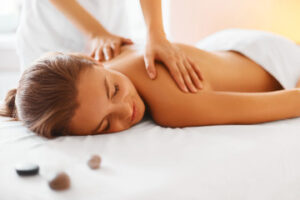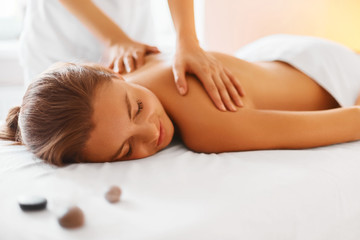Massage is an ancient practice that involves rhythmically skimming the hands over the body to increase blood flow and relax the muscles.
Massage stimulates brain circuitry associated with feeling good, and enhances parasympathetic activity, which helps the body fight off stress and reduces anxiety. It also increases hydration, which is important for muscle health. Contact Massage Tulsa for professional help.
The soothing effects of a massage help reduce stress, pain and discomfort. The gentle stroking and kneading of the soft tissues encourages the body’s relaxation response, which in turn helps to lower stress hormone levels, improve heart rate and breathing and facilitates the removal of waste products from the body. The body’s natural feel good hormones, endorphins, are boosted during massage and this can lead to improved mood and feelings of calmness and well being.
During a full body massage, the therapist uses various techniques to manipulate the soft tissues of the body, including effleurage (sliding strokes), friction, tapotement and petrissage. These movements increase the circulation of blood to the soft tissue, resulting in increased heat which relaxes the muscle and releases tension. They also promote the movement of fluids throughout the body and this can aid in reducing swelling, facilitating healing and flushing out toxins.
A massage can also improve your quality of sleep. It has been shown to decrease cortisol levels, while boosting the production of the body’s natural feel good hormones – dopamine, serotonin and oxytocin. As a result, the body is able to fight stress and anxiety more effectively, leading to a restful night’s sleep.
It is recommended that you book your appointment for a time when you can relax and unwind. It is not a good idea to attend a business meeting, host children’s parties or take an expensive car ride immediately after your treatment. Give yourself the time to get ready, have your massage and then wind down.
It is important to communicate with your therapist during the treatment so they can be sure you are comfortable and happy with the pressure applied. If you are feeling uncomfortable, let them know right away; the therapist should never cause any pain or discomfort. It is also advisable to dress comfortably for your massage, as loose fitting clothing will allow the muscles and other soft tissues to relax more easily. In addition, a warm bath or shower after the massage can further enhance your relaxation and prepare you for a peaceful night’s sleep.
De-stressing
The gentle stroking, kneading and rolling of skin and muscles during massage is more than just self-indulgence and pampering; it’s also a recognised treatment for various illnesses and conditions. Research shows that it’s particularly good for relieving stress-related problems, from anxiety and panic attacks through to high blood pressure, constipation, and even fibromyalgia.
One of the most immediate effects of massage is a feeling of deep relaxation and calm. This is due to the fact that massage prompts the release of endorphins – brain chemicals (neurotransmitters) that produce feelings of wellbeing. Levels of the hormone cortisol, which is produced when you’re stressed, are reduced by massage as well.
In addition to this, massage increases circulation. This is because friction against the skin stimulates the capillaries to dilate – widening them, which allows more blood to flow. This brings oxygen and nutrients to the tissues, removing waste products as well as helping relieve pain and stiffness.
It’s worth bearing in mind that different kinds of massage have slightly different effects on the body. So if you’re thinking of booking a session to help with a specific health concern, do ask your GP first to make sure it’s appropriate. Also bear in mind that some forms of massage involve vigorous movements and/or intense pressure on joints and tissues, which could be a problem for people with rheumatoid arthritis or other chronic joint conditions.
Before you have your massage, remember to dress comfortably. You’ll probably want to keep your clothes on for most kinds of massage, though some may require you to take them off and cover yourself in a sheet. It’s best not to eat anything substantial just before your appointment, and you may find it helpful to drink plenty of water to flush the toxins out of your system. You’ll also need to allow time to relax after your massage – a bath, hot drink, or a lie-down will all work well.
Boosts Immune System
While most people consider massage a relaxing luxury, the act of therapeutic touch actually holds significant physiological responses that strengthen your immune system, especially as cold and flu season is upon us. The act of massaging the body’s soft tissue is a form of passive exercise that stimulates circulation, specifically lymphatic flow. The lymphatic system is responsible for transporting white blood cells throughout the body, as well as removing waste and toxins. This system is often neglected, but regular massage can help keep it functioning properly.
Studies have shown that receiving massage decreases levels of cortisol, the stress hormone that suppresses immune function. It also increases the number of natural killer cells, a type of white blood cell that kills invading viruses and bacteria. This boost in the immune system helps you to stay healthy and strong, despite being bombarded with germs and other seasonal threats.
Researchers have found that receiving a single massage can significantly increase the number of immune-system lymphocytes, which are the cells that fight off infection. Another study found that a single 30-minute session can boost the lymphatic system’s cytotoxic capacity, which is the ability to kill cancer cells and other infectious agents in the body.
When the body’s lymphatic system is working properly, it’s efficient at removing toxins from the body and can effectively transport white blood cells to areas of inflammation. This can help your body to maintain a strong defence against infections.
In addition to boosting the immune system, massage also promotes relaxation and good sleep quality. This is important because poor sleep and stress can significantly diminish the immune system’s effectiveness.
While all types of massage can help support a strong immune system, Shiatsu is particularly effective as it addresses both the physical and energetic pathways that align with immune support. Unlike Swedish and deep tissue massages that focus on the muscular skeletal system, Shiatsu addresses energy pathways in the body that can enhance immunity. This holistic approach is essential for maintaining the proper balance in the body, which is key to a healthy immune system.
Relieves Pain
Massage has been shown to have significant benefits for reducing pain and stiffness. It increases the flow of blood to the tissues, which enhances the delivery of oxygen and nutrients that are critical for cellular function. It may also promote the removal of waste products from the tissues, thereby decreasing the buildup of toxins that can cause inflammation.
This is probably due to both the physical manipulation of soft tissue and the chemicals released during the relaxation response. In addition, massage can stimulate the nerves that send impulses to the muscles to contract and relax them. This can reduce the tension and tightness that causes back pain and other musculoskeletal problems.
Another way massage can relieve pain is by inhibiting the transmission of noxious sensory stimuli. This is the theory behind the gate control theory of pain, which states that rubbing or massaging a painful area can close the gate that transmits signals from the brain to the spinal cord and to other parts of the body, making you feel less pain.
Studies have shown that a single massage can relieve muscle spasms and improve flexibility in people with chronic back pain. It can also speed up the recovery time after a strain or injury and help decrease the use of prescription painkillers. The endorphins released during a massage can give the body a natural high, easing depression and anxiety.
It is important for patients and clinicians to add massage to the “tool box” of treatment options, as it can significantly increase a patient’s quality of life. However, a key challenge is that of developing standardized outcomes and methodologies for massage research that will allow comparisons across different clinical settings.
During massage, the heart rate, blood pressure and breathing all reduce, which can lower the risk of cardiovascular disease. It is also beneficial for the circulatory system, which may protect against stroke and help prevent diabetes. Massage can also increase the elasticity of the arteries and veins, helping them to maintain their integrity. Massage may also increase range of motion and decrease pain in people with fibromyalgia and osteoarthritis of the joints.

